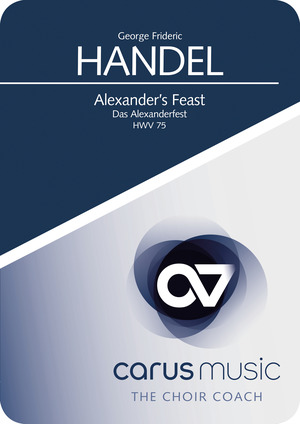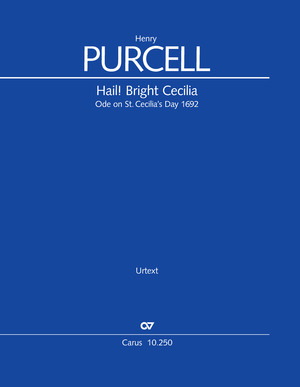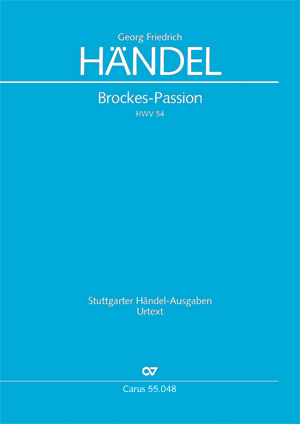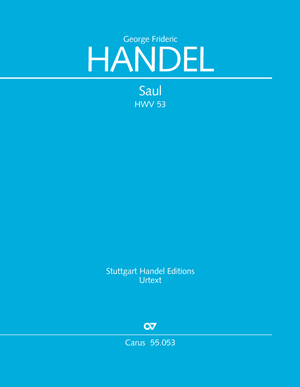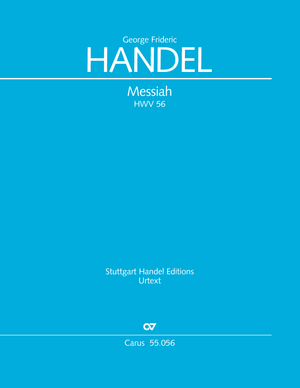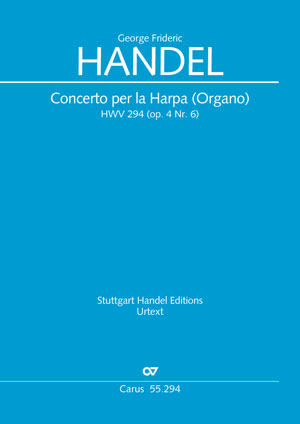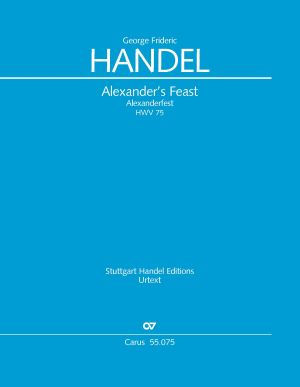
Alexander's Feast
Ode. Version of the first performance and version of 1751 HWV 75, 1736/1751
For the magnificent opening of the oratorio season at the beginning of 1736 Handel presented a composition which, like hardly any of his other oratorios, gave him the opportunity to display his musical artistry: John Dryden’s ode “Alexander’s Feast or the Power of Music”, published in 1696, demonstrates the power of music by the example of the ancient hero, Alexander the Great. From the impressive lament on the death of Darius, the King of Persia, to the boisterous “Praise of Bacchus” Handel avails himself of the entire breadth of the musical representation of the emotions and the possibilities for expression. In the text by Newburg Hamilton added at the end of work St. Cecilia elevates the events of the ancient heathen story, which Handel expressed in plastic, skillful polyphony. Later, this homage to the patron saint of church music, Handel also present the opportunity to perform the work on St. Cecilia's Day (22 November).
For the first time the present new edition is based consistently on Handel’s conducting score, which he used for his own performances of the oratorio, thus not only eliminating timeworn errors, but also offering clarity concerning the choruses, the arias and recitatives, actually performed in Handel’s concerts, as well as their sequence of performance. The new Carus edition offers two performance versions: the version of the premiere in 1736, as well as a revised version from 1751. Furthermore, the inclusion of the Concerto for Harp HWV 294 (CV 55.294) is also possible; Handel composed this work especially for Alexander's Feast (as an illustration of Timotheus, the ancient poet who played the lyre). For this purpose the edition contains the appropriate alternatives for the sequence of the movements.
Contents
-
Composer
Georg Friedrich Händel
| 1685-1759George Frideric Handel put his exceptionally versatile compositional abilities to the test at an early age. After moving to London in 1712, where he was appointed Composer of Musick for His Majesty’s Chapel Royal in 1723, he wrote numerous masterpieces for the royal court as well as his major opere serie. For many years he enjoyed triumphant successes with his operas, which were sung by outstanding performers, with serenades, and later also with oratorios such as Saul and Israel in Egypt. Over the years Handel’s reputation grew far beyond the city where he worked; some of his choral works, particularly Messiah, have enjoyed a performance tradition which remains unbroken to this day, and are sung by choirs throughout the world. Personal details
-
Editor
Felix Loy
| 1963
Reviews
Eine beeindruckende Veröffentlichung ... !
Reinhard Krämer, Württembergische Blätter für Kirchenmusik, 2/2017
Die vorliegende Neuausgabe basiert erstmals konsequent auf der Dirigierpartitur, die Händel für seine eigenen Aufführungen verwendete, und beseitigt dadurch nicht nur einige tradierte Fehler, sondern bietet auch Klarheit über die tatsächlich aufgeführten Chöre, Arien und Rezitative und deren Reihenfolge. Die Ausgabe bietet alternativ zwei aufführbare Fassungen...
Kirchenmusikalische Mitteilungen der Diözese Rottenburg-Stuttgart, Juli 2016
Das Oratorium wurde im Laufe der Zeit mehrfach adaptiert und ist in verschiedenen Fassungen überliefert. Im Vorwort der von Felix Loy im Carus-Verlag verantworteten Neuausgabe sind die verschiedenen Varianten ausführlich dokumentiert. Des Weiteren finden sich wertvolle Hinweise, auch zur Praxis der bei den Händelschen Aufführungen üblichen Instrumentalkonzerte zwischen den beiden Oratoriumsteilen.
Andreas Peterl, Singende Kirche, 3/2016
Frequent questions about this work
 There are no questions and answers available so far or you were unable to find an answer to your specific question about this work? Then click here and send your specific questions to our Customer Services!
There are no questions and answers available so far or you were unable to find an answer to your specific question about this work? Then click here and send your specific questions to our Customer Services!


